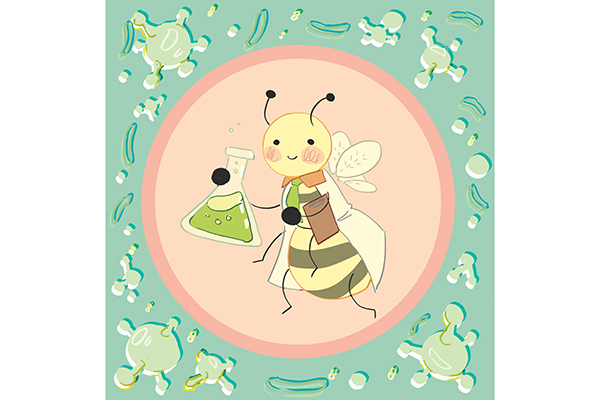UT scientists have engineered strains of bacteria that could live in the guts of honey bees and protect them from mites and viruses, according to a UT press release.
The strains would also protect honey bees from colony collapse, according to the release. This is a disorder that occurs when the majority of worker bees in a colony disappear, according to the United States Environmental Protection Agency website.
“Bees have a microbiome just as humans do, and this microbiome can contribute to bee health,” said Sean Leonard, a cell and molecular biology graduate student. “We started out developing genetic tools for the bacteria that live in the microbiome as a way to understand how they function.”
Leonard said his research team then came across the use of double-stranded RNA to impact bee gene function and protect them against viruses and Varroa mites, which feed on bees. The team activates the bees’ immune systems to help them fight off viral threats, Leonard said.
“The way that double-stranded RNA is usually applied is kind of being fed or injected,” Leonard said. “We thought (we could instead) produce it using the bacteria that live inside the bee gut because they are a lot easier to grow. We got some promising results and expanded on that.”
Beekeepers lost nearly 40% of their honey bee colonies last winter, according to a Bee Informed Partnership survey. This has been the greatest loss since the survey started 13 years ago.
“Bee losses are critically important, and they can change each year, but it has been an ongoing problem for years,” Leonard said. “(Bee loss) wasn’t the main motivating factor of this research because we were initially interested in researching how these bacteria interact with each other. We set out to do something else and kind of discovered (the double-stranded RNA) can be used in this way.”
Alex Pointon, an international relations and global studies freshman, said colony collapse is a massive force that is harmful to both the bee species and the entire agricultural industry.
“Up until now, strategies to combat it were mostly preventative because no one cause could be identified,” Pointon said. “If (the genetically-engineered bacteria) could stop one of the most serious colony die-offs in recent years, I for sure support at least piloting it in a few colonies.”
Integrative biology professor Nancy Moran said the next steps of this research would require experiments that are more realistic in an indoor bee enclosure.
“We did these experiments all in an enclosed lab with bees in small cages or growth chambers in the lab,” Moran said. “Do these (genetically-engineered bacteria) help the whole hive? Do they spread from hive to hive? How long do they persist in hives? All of those are things we don’t know yet.”
Moran said it is important to understand that bees are seasonal when planning these next steps and their time frame.
“In the middle of winter, they are not making new bees and they are relatively inactive, so this (research) has to be done during the warm part of the year,” Moran said. “We hope that we can have more trials this coming spring and summer.”















